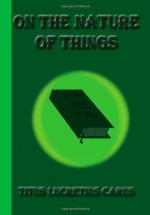|
This section contains 1,367 words (approx. 4 pages at 400 words per page) |

|
Book One
Lucretius begins by invoking the name of Venus as a creative force, appealing to Memmius (to whom the work is addressed), and then praising his master Epicurus. (Scholars have noted the seeming inconsistency in Lucretius' invoking Venus at the beginning of a work that disclaims the gods' involvement with human life. The solution most commonly offered is that such a invocation was standard in the literature of the time, and that by keeping to the standard Lucretius hoped to win the trust and continued attention of readers.) Lucretius states that religion teaches fear, while science teaches fact. He recounts the story of Agamemnon, who was willing to sacrifice his daughter Iphigenia for the good will of the gods. This is not piety, Lucretius says, but rather wickedness demanded by religion.
Next, Lucretius sets about describing atoms as the building blocks of every object and living thing...
|
This section contains 1,367 words (approx. 4 pages at 400 words per page) |

|




